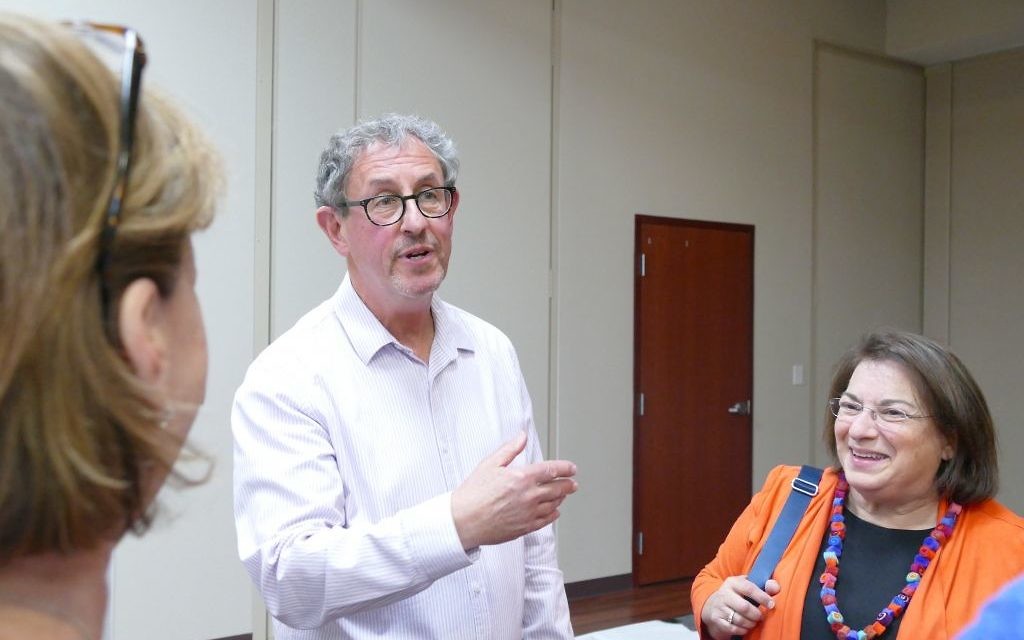Mitzvah Renews Kidney Donors and Recipients
Community gathers to listen to stories and learn more about kidney donations.
“Living with kidney failure is a humbling and daunting experience for anyone struggling with the disease,” Ira Tedoff said Sunday, May 7, at a kidney donation awareness event for the Renewal organization.
The gathering at Young Israel of Toco Hills to share the stories of people who need and who have donated kidneys had the support of Chabad Intown, Ahavath Achim Synagogue, Congregation Bet Haverim, Congregation Shearith Israel, Young Israel of Toco Hills, The Temple, Congregation Beth Shalom and Congregation Or Hadash.
“Asking for a kidney was not easy, and I had to let the experience humble me, as I am not one to ask for things in life,” Tedoff said. “Yet I have grown from it. I had to get out of my state of denial even though I didn’t wish to believe the doctor’s diagnosis. … I slowly had to accept there were things I could no longer do, such as maintaining a full-time practice, working out three to five times a day and spending time with my children.”
Get The AJT Newsletter by email and never miss our top stories Free Sign Up

Tedoff has had two potential kidney donors fall through as systems such as fatigue and short-term memory loss have worsened. “I will now be required to go on dialysis. Yet I must realize the reality of the situation and do what I must to live.”
Shai Robkin donated a kidney to a stranger last year.
“I chose a different path from most donors as the decision was extremely calculated,” he said. “I realized at 63 I would soon age out of donating and began examining my options.”
Robkin learned that most people willing to donate a kidney are rejected or can’t give for financial reasons. However, per federal guidelines kidney recipients are permitted to receive reimbursement for lost income. Furthermore, Renewal will also pay for lost wages and additional expenses incurred by the donor if they are working with a potential recipient.
“I was a suitable candidate,” Robkin said. “I was in perfect health and also in a time in my life where I was cutting down on work commitments.”
Robkin donated his left kidney Dec. 1 to Glorious Echols, whose daughter then donated to another recipient. He has maintained contact with the family.
“You don’t have to be exceptional to donate, but if you’re prepared to do it, an organization or hospital will find a match,” Robkin said.
Rabbi Josh Sturm is the outreach director for Renewal, which facilitates kidney donations. He said Renewal works with hospitals that have experience and adopt the organization’s philosophy, in which donors are heroes and should be treated as such throughout the process, even if they opt out at the last minute.
Renewal streamlines the donation process. Once a match is made, tests and blood work are completed in one day instead of six months. Donors help Renewal by becoming volunteers and educating others about the need and process.
Only 207 people in the United States sought to donate kidneys altruistically in 2016, Rabbi Sturm said, even though “there is a growing need for kidney donations.”
Transplants typically follow one of three paths: a direct donation between family members; a match between a donor and an unrelated recipient; and a chain donation, as with Robkin, in which one donor’s gift leads a relative of the recipient to donate to another unrelated recipient.
Renewal uses various methods to help recipients find donors, and recipients are encouraged to market themselves to find potential donors.
“We are constantly evolving and learning from the process,” Rabbi Sturm said. “Everyone is capable of helping and spreading the word, however, whether it’s through social media, ads or emails. We can all do our part.”
“When someone asks you about the opportunity to save a life, you should take it,” Chabad Intown Rabbi Eliyahu Schusterman said. “The most significant aspect I learned about those suffering from a kidney disease is fundraising. Asking for money from individuals is difficult; however, asking for a kidney is harder. The mitzvah of giving money is one thing; the mitzvah of giving a part of one’s body is quite another.”
The Jewish perspective on kidney donation has evolved, Young Israel Rabbi Adam Starr said. “In the past, we were told not to stand idly by your brother’s blood, meaning if one has the ability to save a life and they fail to do so, they are held responsible. Yet we also examine at what risk this applies to the individual. The sages say one is not required to put their life in danger to save another; however, the Torah also says if one is willing to give a kidney, it is not forbidden.”
Jewish law barred living kidney donation in the 1950s and ’60s because of the risks to the donor, but not anymore, Rabbi Starr said. “It’s still not an obligation but a tremendous act of kindness.”





comments